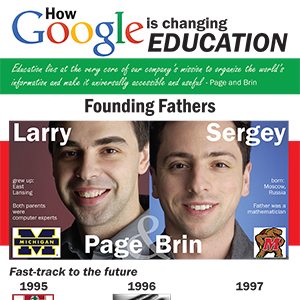How Google is Changing Education
“Education lies at the very core of our company’s mission, to organize the world’s information and make it universally accessible and useful.” — Page and Brin
The founding fathers: Their education
Page grew up in East Lansing: parents were both computer experts
• Graduate of East Lansing (Michigan) High School
• Undergraduate at U. of Michigan
Brin: born in Moscow, Russia. Came to U.S. in 1979. Son of a mathematician.
• Graduate of Eleanor Roosevelt High School in Greenbelt, Maryland.
• Undergraduate at U. of Maryland
1995: Page and Brin met at Stanford.
BackRub: Their first collaboration, in 1996, a search engine. It operates on Stanford servers.
1997: Page and Brin registered Google.com as a domain on Sept. 15.
They named it Google, a play on the word “googol,” a mathematical term for the number represented by the numeral 1 followed by 100 zeros.
Google’s education initiatives focus on:
• Making learning magical for students
• Empowering innovative communities
• Building a foundation of technology and access
Google’s Education Initiatives:
• Google Code in
• CAPE: Computer and Programming Experience (cultivating the next generation of computer scientists)
• LEAD Computer Science Institute (Programs for high achieving minorities)
• App Inventor (allows students to build their own Apps)
• Google Science Fair (International competition)
• You Tube Space Lab (conducting student science experiments in space)
• RISE and Trailblazer awards (Roots in Science and Engineering awards secondary and college students to foster interest in those subjects)
• Doodle 4 Google (Students design Google’s homepage logo)
Internships:
• Google’s Summer of Code
• Computer Science Summer Institute
• Android Camp
The impact of Google education (in one year, 2011)
1 billion: downloads of Google Earth
$20 million: funding awarded by Google to science, tech, engineering and math groups
10,000+: applications for the Google Science Fair
5,097: Alumni of Google’s Summer of Code program
15 million: number of Google Apps used by Education users
146: number of countries in which Google’s Apps for Education is used
45: States and provinces with SketchUp Pro grants
12,000 +: Students visited by Googlers in the school visit program
107,000: Doodle 4 Google competition entries
$8.8 million: value of scholarships granted to 2,100 university students
100 million +: number of views of Khan Academy video lessons on YouTube
500,000+: videos in YouTube EDU
15 million +: Volumes scanned in Google Books (An estimated 10% of the books printed since the Gutenberg Bible
Programs for Developing Student Potential
• Online Marketing Challenge (student teams develop online marketing strategies for real businesses)
• Zeitgeist Young Minds (worldwide competition for 18-24 year olds)
• Making a world class education available to everyone around the world: Google supports Khan University, an online university
Bringing Technology into the Classroom through…
• Chromebooks
• Time range tools
• Google Scholar (makes a broad range of academic research accessible to a global audience)
• Google Earth
• Google SketchUp
• You Tube videos
• Google Apps for Education (another plus: cost is O)
5 Ways Google Glasses could change education (once available to general public…right now, costs $1,500 to developers)
FACT: Glasses will enable users to get real-time information about the places, people, and objects around them, right on the lens of the glasses
• A new way to implement Education Apps
• Disruptive technology could get more disruptive
• Memorization will take a backseat to problem solving and complex thinking
• Traditional textbooks could be replaced
• Classes can take place…anywhere
Chrome Apps for students with special needs
• Chrome Toobox.com
• Special needs Apps in the Android market
• Voice4U ($26.99)
• Tap to Talk ($99.95 per year per child)
• JABtalk ($9.99)
• Model Me Going Places (free)
• Behavior Tracker Pro ($29.99)
Education for veterans (2013)
• $2.3 million: Google Global Impact Award to:
• Institute for Veterans and Military Families
• The Posse Foundation
• Student Veterans of America
• Veterans of Foreign Wars.
Their task: Analyze veterans’ education to identify which programs, services and policies are most effective at helping veterans graduate. Further funding will follow.
Google vs. Apple (and others): who spends the most (in billions) on Research and Development
• $9.4: Microsoft
• $8.4: Intel
• $6.3: IBM
• $5.6: Cisco
• $5.2: Google
• $4.4: Oracle
• $2.6: Apple
On the downside…
Is Google Making Us Stupid?: Google is changing our brains
• A Columbia University study has found that Google and other search engines are literally changing the way our brains process and retain information.
• The study says rather than remembering things, we now simply retain the knowledge of how to find the information we need when we need it.
Sources:
http://www.google.com/about/company/history/
http://static.googleusercontent.com/media/www.google.com/en/us/edu/pdf/Google_EDU_Report_FULL.pdf
http://www.onlineuniversities.com/blog/2012/09/8-amazing-ways-google-glasses-will-change-education/
http://educationstormfront.wordpress.com/2011/07/21/google-is-changing-our-brains/
https://sites.google.com/site/eduonair/virtualization-for-chromebooks/hangout-schedule/chrome-apps-for-assistive-technology
http://www.youtube.com/watch?v=Iu4QSTqM8wY
R&D figures from S&P Capital IQ


